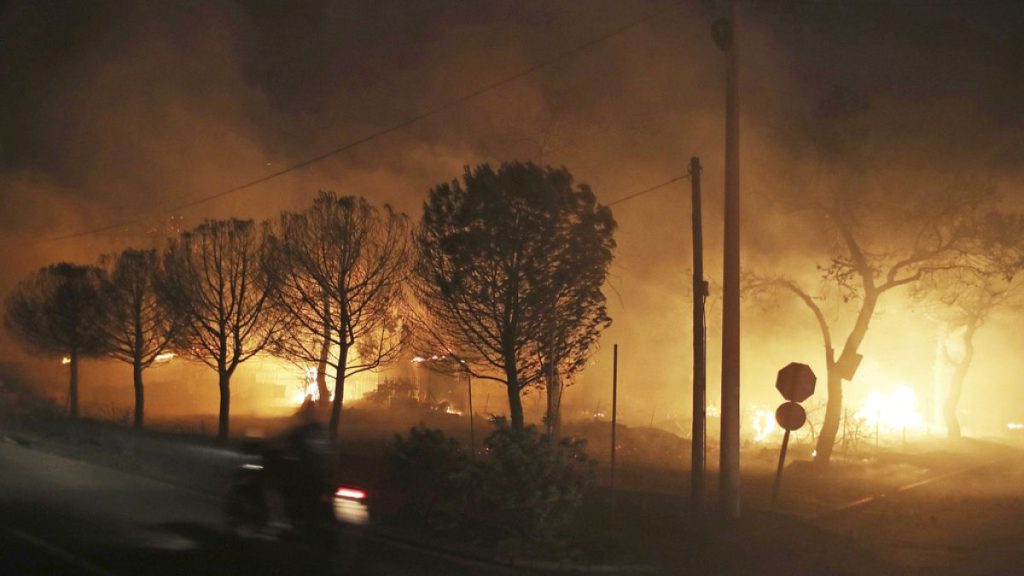The 2018 Attica wildfires case has taken a new turn, as twenty defendants will face a retrial following a controversial ruling that saw only six people convicted for their involvement in the disaster. The decision to retry the defendants came after the Athens Appeals Prosecutor’s Office deemed the previous verdict, which only convicted five officials responsible for responding to the fire, incorrect. These officials, including the former fire chief, received suspended sentences for criminal negligence resulting in injury and loss of life. For survivors like Chrysa Gerakaki, Athina Moutafi, and Aris Herouvim, the retrial has been both disappointing and emotionally challenging.
Chrysa Gerakaki, a Mati resident, expressed her disappointment with the initial trial, stating that she felt there was no justice served. Athina Moutafi, who lost her son during the disaster, fought for six hours to save her daughter and survived the tragic event. Testifying during the trial was emotionally taxing for Moutafi as she had to relive the traumatic experience. Aris Herouvim, who lost his mother, sister, and twin nieces in the fire, also expressed his frustration with the lack of justice in the initial trial. Despite feeling that justice was negated during the first trial, Herouvim expressed some satisfaction that the flaws in the initial proceedings were acknowledged.
The impact of the 2018 Attica wildfires on the survivors has been profound, with many still grappling with the loss of loved ones and the trauma of the disaster. The retrial provides an opportunity for these individuals to seek justice and closure for the losses they endured. The emotional toll of reliving the events of that tragic day has weighed heavily on survivors like Athina Moutafi, who had to recount the harrowing experience of losing her son and nearly losing her daughter. The retrial represents a chance for these survivors to have their voices heard and for accountability to be upheld for those responsible for the inadequate response to the wildfires.
The decision to retry the twenty defendants in the 2018 Attica wildfires case underscores the importance of holding individuals accountable for their actions in the face of a natural disaster. The initial verdict, which only convicted a minority of the defendants, was met with disappointment by survivors and raised questions about the effectiveness of the justice system in addressing such disasters. The retrial offers an opportunity for a thorough examination of the events leading up to and following the wildfires, with the hope of delivering a fair and just outcome for the survivors who continue to seek closure and justice for their losses.
The retrial of the twenty defendants in the 2018 Attica wildfires case represents a significant step towards justice for the survivors of the disaster. The decision to retry the defendants came after the initial verdict was deemed incorrect, highlighting the need for a more comprehensive examination of the events surrounding the wildfires. Survivors like Chrysa Gerakaki, Athina Moutafi, and Aris Herouvim have expressed their struggles with the emotional toll of the trial but also their determination to seek accountability for those responsible for the inadequate response to the disaster. The retrial offers a chance for these survivors to have their voices heard and for justice to be served for the lives lost and the trauma endured during the wildfires.
The retrial of the defendants in the 2018 Attica wildfires case is a reminder of the long-lasting impact of natural disasters and the importance of accountability in responding to such crises. Survivors of the wildfires continue to fight for justice and closure, despite the emotional toll of reliving the events of that tragic day. The retrial provides an opportunity for a more thorough examination of the circumstances surrounding the disaster and for accountability to be upheld for those responsible for the loss of life and devastation. As the trial proceeds, the survivors of the 2018 Attica wildfires remain hopeful that justice will be served and that those responsible will be held to account for their actions.









